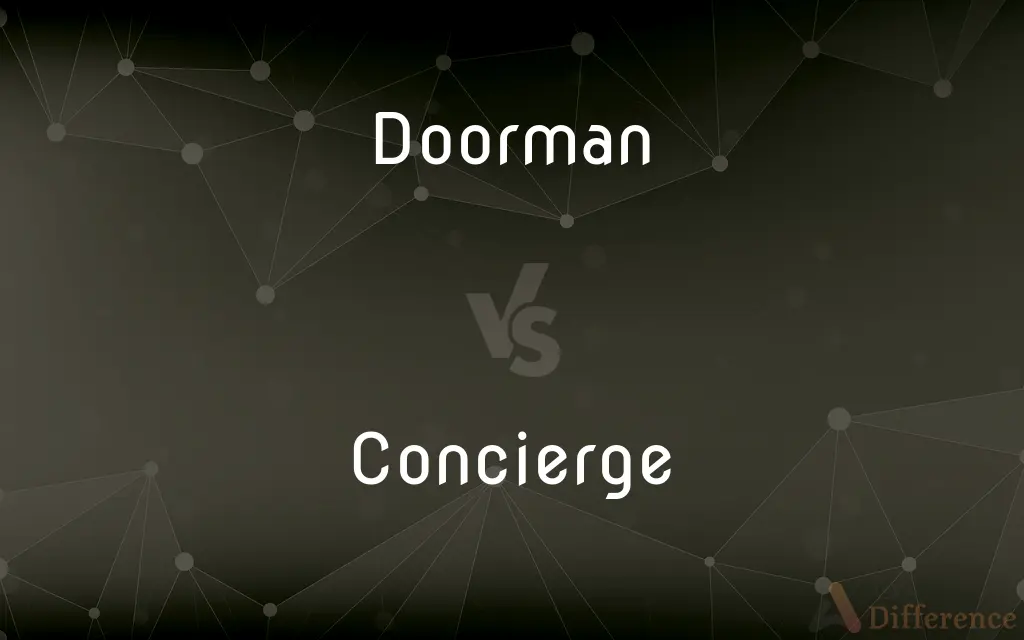Doorman vs. Concierge — What's the Difference?
Edited by Tayyaba Rehman — By Fiza Rafique — Updated on May 1, 2024
A doorman controls access to a building and greets residents, while a concierge provides personalized services like making reservations and arranging transportation.

Difference Between Doorman and Concierge
Table of Contents
ADVERTISEMENT
Key Differences
A doorman is primarily stationed at the entrance of residential or commercial buildings to monitor who enters and exits, ensuring security and privacy for residents. On the other hand, a concierge typically works in hotels or high-end residential buildings, focusing on assisting guests and residents with personal requests and services.
Doormen are known for their role in greeting residents and visitors, managing the reception of packages, and providing a general sense of security. Whereas, concierges offer a broader range of services, including booking travel, securing tickets to events, and making dining reservations.
In many buildings, the doorman's responsibilities are limited to the physical aspects of the building's management, such as handling deliveries and overseeing the entry area. Conversely, the concierge often deals with more intricate requests that require local knowledge and extensive networking skills.
While doormen may assist with basic tasks and inquiries, their role does not usually extend to the personalized service provided by concierges. Concierges, on the other hand, are expected to fulfill specific and often complex requests, enhancing the overall experience of the guests or residents.
The presence of a doorman in a building often adds a layer of formality and security, providing a deterrent against unauthorized access. In contrast, a concierge adds a layer of luxury and convenience, aiming to make life easier and more enjoyable for those they serve.
ADVERTISEMENT
Comparison Chart
Primary Role
Manages access to the building, provides security.
Provides personalized services to guests/residents.
Service Scope
Limited to building entry management and package handling.
Wide-ranging, from travel arrangements to event bookings.
Skill Set
Focus on security and basic customer service.
Requires extensive local knowledge and networking.
Workplace
Typically found in residential and commercial buildings.
Commonly located in hotels and luxury residential buildings.
Impact on Guests
Adds a sense of security and order.
Enhances convenience and luxury of the experience.
Compare with Definitions
Doorman
Symbol of safety and professionalism in building management.
Having a doorman made her feel secure in her new apartment.
Concierge
Someone who makes reservations and arranges events.
The concierge found tickets for the sold-out concert.
Doorman
A person employed to control the access to a building.
The doorman checked everyone's IDs before allowing entry.
Concierge
A professional offering tailored services to enhance guest experiences.
The concierge recommended the best restaurants nearby.
Doorman
A role often associated with maintaining order at the entrance.
The doorman refused entry to unauthorized visitors.
Concierge
A hotel employee who assists guests by performing various personal services.
The concierge booked us a tour of the city.
Doorman
An attendant who greets and assists residents and visitors.
The friendly doorman waved hello every morning.
Concierge
A resource for local information and connections.
The concierge knew all the top spots in town.
Doorman
A guardian of physical security at a residential or commercial establishment.
The doorman helped her with her heavy packages.
Concierge
A pivotal figure in luxury residential complexes for personal assistance.
The building’s concierge helped him organize a surprise party.
Doorman
A man employed to attend the entrance of a hotel, apartment house, or other building.
Concierge
A concierge (French pronunciation: [kɔ̃sjɛʁʒ]) is an employee of a multi-tenant building, such as a hotel or apartment building, who receives guests. The concept has been applied more generally to other hospitality settings and to personal concierges who manage the errands of private clients.
Doorman
A person who holds open the door at the entryway (entrance) to a building, summons taxicabs, and provides an element of security; in apartment buildings, he also accepts deliveries and may perform certain concierge type services.
Concierge
A staff member of a hotel or apartment complex who assists guests or residents, as by handling the storage of luggage, taking and delivering messages, and making reservations for tours.
Doorman
Someone who guards the entrance to a building.
Concierge
A person, especially in France, who lives in an apartment house, attends the entrance, and serves as a janitor.
Doorman
Someone who guards an entrance
Concierge
One who attends to the wishes of hotel guests.
Concierge
(British) One who attends to the maintenance of a building and provides services to its tenants and visitors.
Concierge
(obsolete) conciergerie.
Concierge
One who keeps the entrance to an edifice, public or private; a doorkeeper; a janitor, male or female.
Concierge
A French caretaker of apartments or a hotel; lives on the premises and oversees people entering and leaving and handles mail and acts as janitor or porter
Common Curiosities
Can a doorman also act as a concierge?
Typically, these roles are distinct; however, in some smaller or boutique settings, one person might perform both functions.
Can a concierge provide security services like a doorman?
While concierges are not typically focused on security, they contribute to safety by managing who gets assistance and information.
How can a concierge enhance a guest's experience?
By providing tailored services, making arrangements, and offering expert advice on local attractions, a concierge enhances guests' convenience and enjoyment.
What types of requests can a concierge handle?
From travel bookings to acquiring hard-to-get reservations and tickets, concierges handle a variety of personal requests.
Why might someone choose to live in a building with a concierge?
For the convenience, personalized service, and luxury experience a concierge offers.
How does the presence of a doorman impact a residential building’s atmosphere?
A doorman can make a building feel more prestigious, secure, and well-managed.
What is the primary difference between a doorman and a concierge?
A doorman focuses on security and managing building access, while a concierge provides personalized services and assistance.
What kind of training does a concierge need?
Concierges often require training in customer service, local area knowledge, and problem-solving skills.
Is a doorman's role important in commercial buildings?
Yes, doormen can provide an essential layer of security and manage access in commercial settings.
What skills are essential for a concierge?
Key skills include excellent communication, customer service, problem-solving, and a deep knowledge of local facilities and services.
Are doormen present in all residential buildings?
Not all residential buildings have doormen; their presence often depends on the building’s size and the level of security desired.
Do doormen interact with visitors as much as concierges?
Doormen primarily manage access and may have limited interactions compared to concierges, who engage deeply with guests’ personal needs.
What is the historical origin of the concierge role?
The role dates back to medieval times when concierges managed the entrances of castles and large buildings in Europe.
Are concierges more common in certain parts of the world?
Concierges are more prevalent in regions with a high concentration of luxury hotels and residential buildings, such as in major cities and tourist destinations.
What makes a good doorman?
Good doormen are vigilant, courteous, and effective in managing both security and resident interactions.
Share Your Discovery

Previous Comparison
Subcutaneous vs. Subdermal
Next Comparison
Globalism vs. InternationalismAuthor Spotlight
Written by
Fiza RafiqueFiza Rafique is a skilled content writer at AskDifference.com, where she meticulously refines and enhances written pieces. Drawing from her vast editorial expertise, Fiza ensures clarity, accuracy, and precision in every article. Passionate about language, she continually seeks to elevate the quality of content for readers worldwide.
Edited by
Tayyaba RehmanTayyaba Rehman is a distinguished writer, currently serving as a primary contributor to askdifference.com. As a researcher in semantics and etymology, Tayyaba's passion for the complexity of languages and their distinctions has found a perfect home on the platform. Tayyaba delves into the intricacies of language, distinguishing between commonly confused words and phrases, thereby providing clarity for readers worldwide.
















































